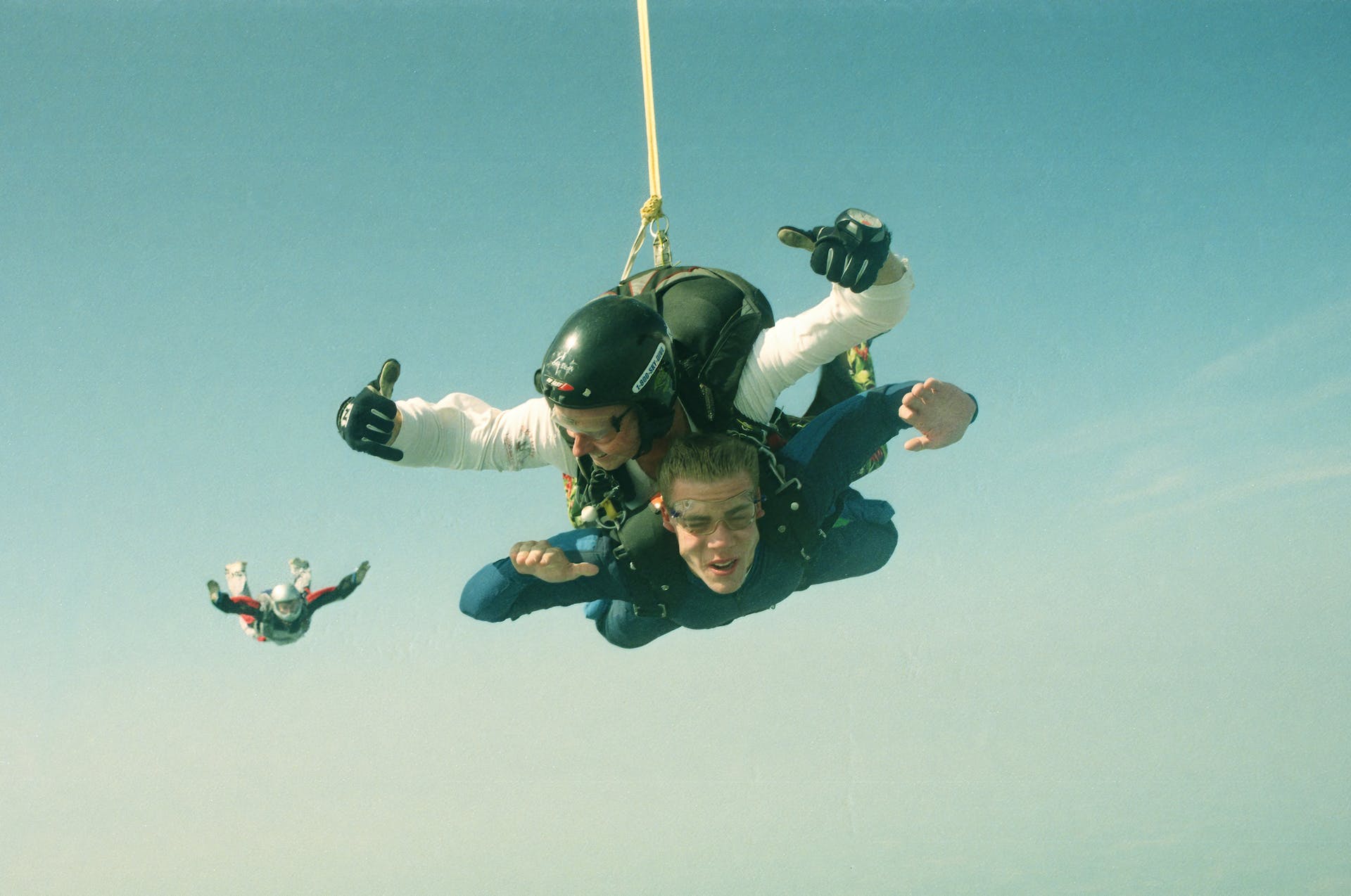How does participation in extreme sports like base jumping and skydiving affect psychological resilience?

As we explore the world of extreme sports, we will delve into the connection between such high-adrenaline activities and psychological resilience. You might be wondering if there is indeed a link between these elements. Is it possible for sports like base jumping and skydiving to shape and strengthen our mental fortitude? Let’s uncover these intriguing aspects together.
A Deep Dive into Extreme Sports
Before we get into the psychological aspects, it’s crucial to understand exactly what extreme sports encompass. In essence, extreme sports, sometimes referred to as action or adventure sports, are activities that are characterized by a high level of inherent danger. These activities often involve speed, height, a high level of physical exertion, and highly specialized gear or spectacular stunts.
A découvrir également : Can the use of smart clothing and textiles in fitness regimes enhance performance monitoring and injury prevention?
Most notably, two of the most adrenaline-pumping sports are base jumping and skydiving. These sports are not for the faint of heart – they require a significant amount of physical preparation and mental strength. They push the limits of fear and defy gravity, and as such, are considered among the most extreme of all sports.
Base jumping involves jumping from a fixed structure or cliff, while skydiving is the act of jumping from an aircraft and performing acrobatic maneuvers in the air during free fall before landing by parachute. Though they are different in nature, they both provide an adrenaline rush that is unmatched by most activities, providing an experience that is both terrifying and exhilarating. But how does this relate to psychological resilience?
Avez-vous vu cela : What are the potential health benefits of involvement in citizen science projects and environmental monitoring?
The Link Between Extreme Sports and Psychological Resilience
Contrary to what you might think, extreme sports are not merely about thrill-seeking or risk-taking. They also have profound effects on one’s psychological resilience.
Psychological resilience can be defined as the ability to mentally or emotionally cope with a crisis or to return to pre-crisis status quickly. It involves bouncing back from difficult experiences and being able to adapt well in the face of adversity, trauma, tragedy, threats, or significant sources of stress.
Participation in extreme sports puts individuals in high-stress situations where they must confront their fears and push their limits. In dealing with these challenges, individuals develop coping mechanisms and adapt their emotional responses. They learn to manage fear, to control their impulses, and to stay calm under pressure.
How Extreme Sports Boost Psychological Resilience
Now let’s delve into how exactly participation in extreme sports like base jumping and skydiving can enhance psychological resilience.
Firstly, these sports require a high level of self-confidence and belief in one’s abilities. To take the leap – quite literally – and participate in these activities, individuals must possess a strong belief in their ability to successfully complete the activity. This confidence carries over into other areas of life, bolstering self-esteem and creating a virtuous cycle of self-belief and resilience.
Secondly, these sports force individuals to face their fears. This is not a trivial feat. It involves coming face to face with one’s mortality, with the specter of fear, and learning to master it. As individuals conquer their fears in the sports arena, they’re likely to find that they can carry this fearlessness into other areas of life.
Lastly, these sports teach individuals to remain calm under pressure. When hurtling towards the ground at high speed, there’s no room for panic. It’s a situation that demands calm, composed action. This sort of pressure-cooker situation can train individuals to stay composed in other high-stress situations, enhancing their ability to cope with adversity.
Strengthening Psychological Resilience Beyond Extreme Sports
While the connection between extreme sports and psychological resilience is clear, it’s important to note that such sports are just one of many ways to boost mental fortitude.
Mental resilience can also be cultivated through practices such as mindfulness meditation, cognitive behavioral therapy, and other stress management techniques. Building a strong support network of friends and family can also provide a buffer against life’s challenges, helping to cultivate psychological resilience.
Furthermore, a balanced lifestyle, including regular exercise, a healthy diet, and adequate sleep, is also crucial for maintaining mental resilience. After all, a healthy body can often lead to a healthy mind.
The Takeaway
In conclusion, it’s clear that participation in extreme sports like base jumping and skydiving can have a profound impact on psychological resilience. These high-adrenaline activities push individuals to their limits, helping them to build a strong sense of self-confidence, face their fears, and learn to stay calm under pressure.
While extreme sports may not be for everyone, they certainly offer a unique and effective way to build psychological resilience. However, it’s also important to remember that there are other methods to strengthen mental fortitude, suggesting that we all have the potential to enhance our psychological resilience, regardless of whether we choose to jump out of a plane or not.
The Biological Impact of Extreme Sports on Psychological Resilience
To appreciate the full scope of how extreme sports like base jumping and skydiving can bolster psychological resilience, it’s essential to understand the biological processes at play.
Engaging in extreme sports prompts an adrenaline rush, a natural reaction to high-stress situations. This response is triggered by the nervous system, which releases adrenaline into the bloodstream, leading to an increase in heart rate, blood pressure, and energy levels. This "fight or flight" response enhances physical and mental alertness, allowing the individual to think and act quickly under pressure.
Base jumpers and skydivers experience this adrenaline surge as they prepare for and execute their jumps. The repeated exposure to these high-intensity situations can gradually condition the nervous system, teaching it to respond more effectively to stress. Over time, individuals can learn to manage their reactions to high-pressure situations and control their fear responses.
The natural environment also plays a significant role in shaping psychological resilience among those who participate in extreme sports. Whether it’s base jumping off a cliff or skydiving from an aircraft, these sports are often conducted outdoors, in stunning, awe-inspiring settings. This connection with nature has been shown to have a positive impact on mental health, further contributing to the resilience-building effects of extreme sports.
The Research on Extreme Sports and Psychological Resilience
Research into the effects of extreme sports on psychological resilience has yielded some fascinating insights. Enthusiasts often articulate that physical activity, such as base jumping or rock climbing, offers a significant mental boost, enhancing their ability to cope with life’s ups and downs.
A study led by David Gallagher, author of various scholarly articles in the field, explored this topic in-depth. The study found that extreme sports participants exhibited greater resilience, higher levels of self-confidence, and better stress management capabilities compared to non-participants.
In another study by Brymer & Schweitzer, participants described feeling a better sense of control over their lives, a stronger sense of self, and a deeper connection with nature. These are all factors that contribute to enhanced psychological resilience.
Interestingly, their research also revealed that many participants used mental strategies to manage fear and stress during their activities. These strategies, developed over time, became valuable tools that participants could apply in other areas of life, further bolstering their resilience.
Conclusion: The Thrill and the Resilience
In summary, extreme sports like base jumping and skydiving offer much more than an adrenaline rush. They provide a platform for individuals to challenge themselves, test their limits and develop strategies to cope with high-risk situations.
The physical and mental demands of these sports, combined with the awe-inspiring natural environments in which they’re often conducted, offer a powerful boost to psychological resilience. Studies led by professionals like David Gallagher support these claims, highlighting the beneficial effects of extreme sports on mental health.
However, it’s worth noting that these sports come with inherent risks, and not everyone might feel comfortable participating in them. Fortunately, there are other ways to build psychological resilience, such as mindfulness meditation, cognitive behavioral therapy, maintaining a healthy lifestyle, and nurturing a strong support network.
The key takeaway here is that whether you’re a base jumper, a rock climber, or someone who prefers to keep their feet firmly on the ground, psychological resilience can be built and developed over time. And that’s a step in the right direction towards better mental health.
